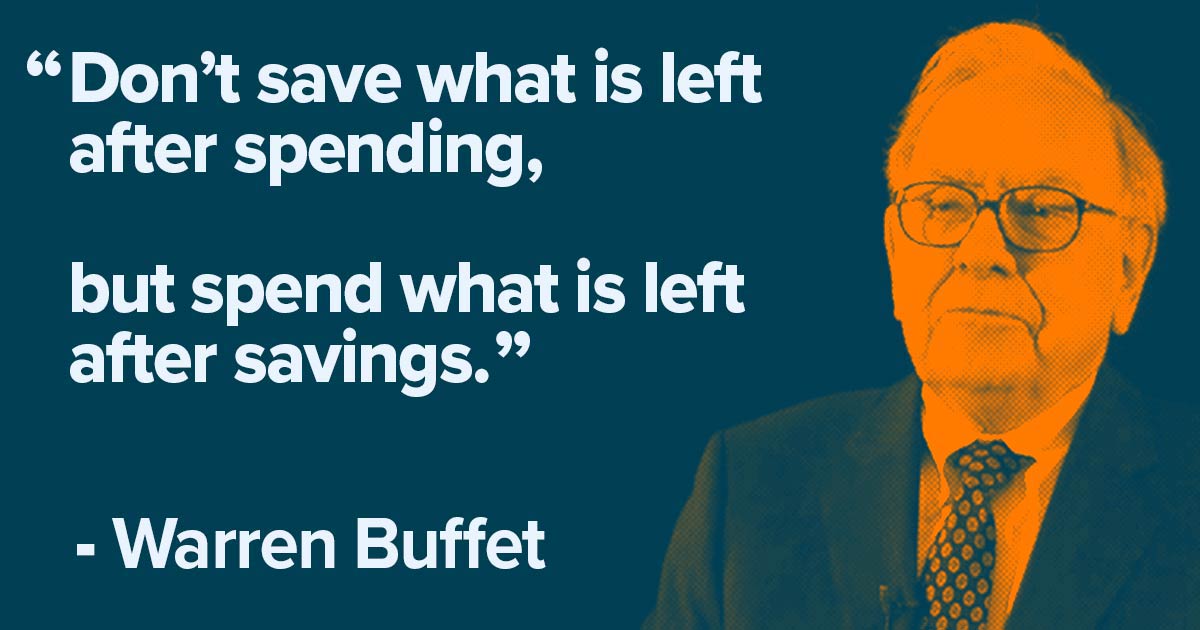Are you saving for your future? Here are some Quick Tips to get you started even in today’s economy.
When it comes to making money, there is no doubt that Warren Buffett can be looked to as a shining example of success. While his business expertise sure plays into his tremendous wealth, he is also a huge proponent of savings and often tells people, “Don’t save what is left after spending, but spend what is left after savings.”

If you’re looking for the best ways to save more money, here are some quick tips to get you started.
Record your expenses!
The first step to saving money is knowing exactly how much you spend. In fact, according to a recent survey from the Penny Hoarder website, 56 percent of Americans say they have no idea how much they spent last month.
- Keep track of all your expenses: that means everything from your monthly Netflix bills to the daily $6 latte. Once your numbers are in place, organize the data by categories, such as gas, groceries, mortgage, and entertainment, and then total each amount.
- Audit all of your recurring expenses. Most people are shocked to find out how much money is coming out of their account on a monthly basis from subscription services that they may not even use. Monthly bills like Amazon Prime, cable TV, internet, and gym memberships really add up.
The survey found that those who kept a budget were more likely to know how much they spent last month and were less likely to say they splurged on something that hampered their ability to pay their bills.
Cut down on your grocery budget.
While we know that inflation will make this step more complicated, savings guru Dave Ramsey suggests sitting down and really looking at what you are spending on groceries every month.
According to the USDA, the average thrifty American family of four spends around $966 a month on groceries. But, Ramsey says those numbers are likely due to what he calls budget busters. “It is so easy to walk through those aisles, grabbing a bag of Oreos here and a few bags of chips there, and then top it off with the fun goodies at the register. But those little purchases (aka budget busters) add up quite a bit and end up blowing the budget every single month.”
But if you can’t cut back, you can still save big with a bit of planning and strategies like couponing and stockpiling grocery items when they are on sale. Creating a small stockpile allows you to determine how much you pay — rather than letting the retailer impose their prices on you, according to Cindy Livesey, a frugal-living expert from coupon website Living Rich With Coupons.
Save for emergencies!
According to a new Bankrate survey, nearly half of U.S. adults have less or no savings compared to a year ago. But even worse, their poll showed that only 43% of U.S. adults said they could pay for an unexpected emergency expense from their savings.
An emergency fund is a bank savings account with money set aside to pay for unexpected emergencies, such as:
- Unexpected medical expenses.
- A major home-appliance repair or replacement.
- A vehicle breakdown and repair expenses.
- Natural disasters and issues that insurance may not cover.
- The loss of a job.
Creating an emergency fund will give you the financial buffer you need to get you through a tough time without relying on credit cards or high-interest loans. Financial expert Rachel Cruze suggests first starting with a starter emergency fund of $1,000. Then, once you’re out of debt, she says, “it’s time to beef up that amount and save three to six months of expenses in a fully funded emergency fund.”
Have separate Savings Accounts
Creating different savings accounts for different needs can be a good way to stick to your goals and might help you save more over time.
People who categorize their budget are often reluctant to spend money that isn’t budgeted to these categories. Doing the same with your savings can help you manage your goals. For example, you might want to have a savings account that is strictly for your emergency fund – something you can pull from during times of need. You may also want to have one geared toward your future goals, things like your child’s education, a future vacation, or that house you’ve been dreaming of – in that case, a high-yield option like our latest certificate accounts might be something to look into.




